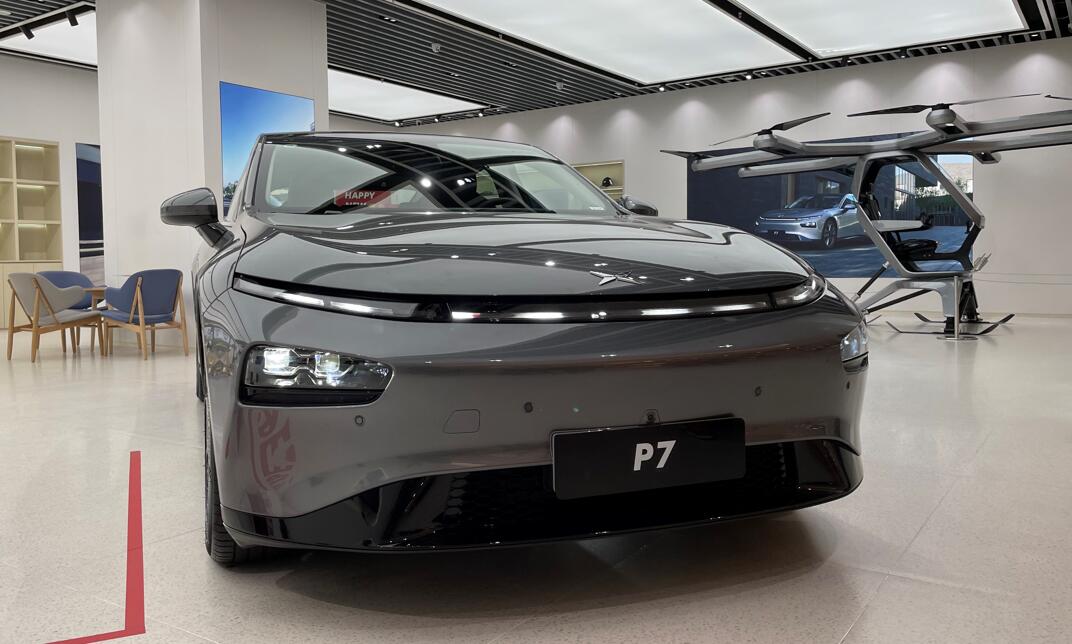Deutsche Bank analyst Edison Yu's team lowered their price target on Xpeng by $2 to $53, taking into account slightly lower expected sales.

(Image credit: CnEVPost)
Xpeng Motors (NYSE: XPEV, HKG: 9868) will report unaudited first-quarter earnings on Monday, May 23 before the US stock market opens, and as usual, Deutsche Bank analyst Edison Yu's team provided their preview.
"We expect a somewhat mixed quarter but expect investor attention to be focused on the 2Q outlook and commentary around the supply chain situation following the Covid lock downs," Yu's team said in a research note sent to investors today.
The team expects a somewhat mixed picture for the quarter, with revenue expected to come in at RMB 7.41 billion, gross margin at 12.3 percent and adjusted earnings per share at -2.33.
That compares with a consensus of RMB 7.37 billion, 12.7 percent, and -1.90 among analysts in a Bloomberg survey.
Margins were not impacted by higher raw material prices, as Xpeng spent much of the quarter using parts from old inventory, the team said.
Xpeng has released figures showing it delivered 34,561 vehicles in the first quarter, up 159 percent from a year earlier and down 17 percent from the fourth quarter last year.
That delivery volume exceeded the upper end of the company's previous guidance range of 33,500 to 34,400 vehicles for first-quarter deliveries.
Its revenue guidance for the first quarter was RMB 7.2 billion to RMB 7.3 billion, implying a year-on-year growth rate of about 144.0 percent to 147.4 percent.
Outlook for the second quarter
Yu's team expects Xpeng's delivery guidance for the second quarter is likely to be about 33,500 units, down slightly from the previous quarter but implying an increase in monthly deliveries from about 9,000 units in April.
Visibility remains low given the supply chain, the team added.
In terms of gross margin, the team believes the second quarter could see some sequential declines and be the low point of the year due to an imbalance in orders, as orders placed before the price increase are fulfilled with newly purchased parts at higher prices.
Outlook for 2022
The base case for Yu's team assumes that Xpeng production returns to a more normal level in the second half of the year. The Shanghai area is slowly recovering and appears to be targeting full normal operations by the end of June, the team noted.
Xpeng has over 20,000/month of capacity at its Zhaoqing, Guangdong plant, but given component constraints, the team does not expect to reach that level until the fourth quarter.
In addition, deliveries of the new G9 SUV are still planned to start in the third quarter, probably by the end of the quarter, but the team expects limited contribution to sales until November and December.
Overall, they are lowering their full-year Xpeng delivery forecast by 5,000 units to 185,000 units, implying an 88 percent year-on-year increase.
Potential policy stimulus
In addition to the company's fundamentals, discussions have recently begun to grow that China will increase stimulus for the auto industry, particularly in the new energy vehicle (NEV) sector.
China is in talks with automakers to extend subsidies for electric vehicles that were set to expire in 2022, aiming to maintain growth in a key market amid a broader economic slowdown, Reuters said yesterday, citing three people familiar with the matter.
The country's purchase subsidies for NEVs, which were scaled back by 30 percent this year from 2021, will be completely withdrawn by 2023, according to previous plans.
China is also expected to introduce new policies in early June to boost car consumption in rural areas, the official China Securities Journal reported on Tuesday, citing several industry sources.
The country aims to encourage residents in rural areas to spend less than 150,000 yuan ($22,230) on cars, including internal combustion engine vehicles as well as NEVs, according to the report.
Yu's team believes Xpeng could be considered a relative winner of the subsidy because its average selling price is much lower than that of Nio (NYSE: NIO, HKG: 9866). In addition, Li Auto (NASDAQ: LI, HKG: 2015) already doesn't receive any subsidies, and it probably won't reach the price threshold for next year's all-electric vehicles, the team noted.
Under current Chinese policy, NEVs priced above RMB 300,000 before subsidies are not eligible for purchase subsidies, but models like Nio's battery swap-enabled models are exempt from that restriction.
In practice, the supply of Xpeng is already very tight, so the actual benefits of any stimulus won't necessarily be felt this year, Yu's team said.
The team lowered its price target on Xpeng by $2 to $53, still based on 3.5 times 2023 EV/Sales, taking into account slightly lower expected sales.
Xpeng closed down 3.8 percent to $23.04 in the US on Wednesday, and the target price implies a 130 percent upside.
Recent reports of policy stimulus may have helped market sentiment, while the broader sell-off in growth stocks is acting as a counterbalance, the team said.




